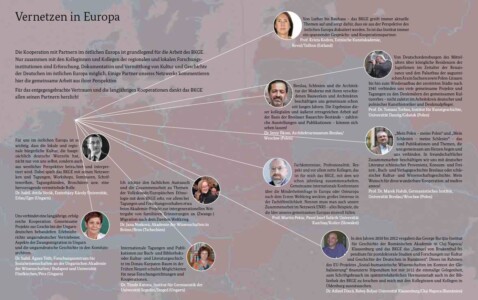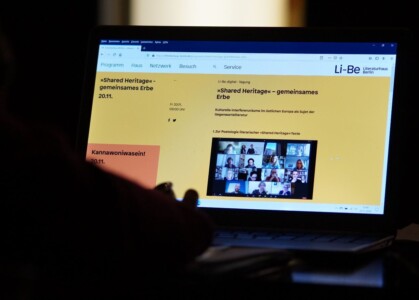Über uns - Institutsprofil
Über uns - Institutsprofil
Gegründet im Januar 1989 und ansässig in Oldenburg, ist das BKGE eine Ressortforschungseinrichtung im Geschäftsbereich des Beauftragten der Bundesregierung für Kultur und Medien (BKM). Dort ist es die einzige Einrichtung mit dem Auftrag der wissenschaftsbasierten Politikberatung im Bereich von Geschichte und Erinnerung. Dem spezifischen Konzept der Ressortforschung entsprechend sind die Kombination von wissenschaftlicher Dienstleistung für den Staat, Unterstützung bei hoheitlichen Aufgaben sowie in wissenschaftlicher Unabhängigkeit durchzuführender ergänzender Forschung kennzeichnend für unsere Tätigkeit. Das BKGE ist den Leitlinien der Arbeitsgemeinschaft der Ressortforschungseinrichtungen verpflichtet.
Als An-Institut der Carl von Ossietzky Universität Oldenburg sind wir in die Hochschullehre eingebunden und verstehen uns als Teil der internationalen Scientific Community. Wir initiieren und koordinieren bundesgeförderte Projekte und führen im Auftrag der Bundesregierung selbst Projekte und Forschungen durch, die wir am Bedarf von Politik und Gesellschaft ausrichten. Wir kommunizieren in vielen Sprachen und arbeiten multidisziplinär. Geschichte, Kunstgeschichte, Literaturwissenschaft sowie Europäische Ethnologie/Empirische Kulturwissenschaft stehen bei uns in einem steten Austausch.
Entsprechend unserem Auftrag liegt ein Schwerpunkt der Beratungstätigkeit und der wissenschaftlichen Arbeit auf der Kultur und Geschichte der Deutschen im östlichen Europa. Wir beraten und unterstützen die Bundesregierung in allen Fragen, die mit der Umsetzung des § 96 des Bundesvertriebenengesetzes (BVFG) verbunden sind. Dies umfasst die Zeit vom Mittelalter bis zur Gegenwart und reicht regional von der Ostsee bis zur Adria und von der Oder-Neiße-Grenze bis nach Zentralasien. Dabei werden Akzente auf die Bewahrung und Erforschung des materiellen und immateriellen Kulturerbes der Deutschen gesetzt, auf deren Flucht, Vertreibung, Integration und (Spät-)Aussiedlung sowie auf den Erinnerungstransfer von der Generation der Zeitzeuginnen und Zeitzeugen auf nachfolgende Generationen. Im Auftrag des BKM begleitet das BKGE durch Fachgutachten Förderprogramme des BKM sowie die Tätigkeit der durch den Bund geförderten Einrichtungen, die sich mit der Erforschung, Dokumentation und Vermittlung deutscher Kultur und Geschichte im östlichen Europa befassen. Darüber hinaus ist das BKGE für die Umsetzung der Projektförderung der Bundesregierung in diesem Bereich zuständig und setzt sich u. a. durch die Vergabe von Stipendien für die Förderung des akademischen Nachwuchses ein. Dadurch trägt das BKGE dazu bei, Kultur und Geschichte der Deutschen im östlichen Europa auch künftig in Gesellschaft und Wissenschaft präsent zu halten und deren Relevanz und Aktualität zu verdeutlichen.
Wir
begreifen Kultur und Geschichte der Deutschen im östlichen Europa als Teil
einer vielfach verflochtenen, gemeinsamen Geschichte.
Deshalb ist das BKGE als Institut der wissensbasierten Politikberatung in die universitäre und institutionelle Forschungslandschaft der Bundesrepublik Deutschland eingebunden und steht mit zahlreichen in- und ausländischen Partnern im wissenschaftlichen Austausch.
Mit der Vertretung des BKM im Europäischen Netzwerk Erinnerung und Solidarität (ENRS) durch das BKGE beraten wir die Bundesregierung seit 2005 in erinnerungspolitischen Fragen mit Blick auf das östliche Europa, insbesondere im 20. Jahrhundert. Das Spektrum der Beratung und Unterstützung der Bundesregierung im Bereich der Kultur und Geschichte des östlichen Europa hat sich seitdem kontinuierlich erweitert und damit auch zu neuen Akzentsetzungen in unserer wissenschaftlichen Arbeit geführt.
Wer
sich mit dem östlichen Europa beschäftigt, beschäftigt sich mit Vielfalt.
Multiple und hybride sprachliche, ethnische, politische und religiöse
Zugehörigkeiten sind ebenso charakteristisch wie Migrationen und kulturelle
Interferenzräume, die wir heute als gemeinsames Erbe, als Shared Heritage,
untersuchen. Zugleich steht das östliche Europa wie kein anderer Teil unseres
Kontinents für nationale Konflikte sowie für die Gewaltgeschichte des 20.
Jahrhunderts, für revolutionäre Gesellschaftsentwürfe, die in totalitäre
Systeme umschlugen, und es wurde zum Schauplatz der beispiellosen deutschen
Besatzungs- und Vernichtungspolitik im Zweiten Weltkrieg. Es folgten
Fluchtbewegungen und Zwangsmigrationen, die die Bundesrepublik, die DDR und das
vereinigte Deutschland ebenso geprägt haben wie die Ankunft der
(Spät-)Aussiedler aus den Staaten des östlichen Europa und Zentralasiens. Die
Geschichten und Schicksale dieser Menschen sind für uns nicht Vergangenheit,
sondern gerade heute wieder aktuell. Deshalb tragen wir durch Politikberatung,
Forschung und Lehre dazu bei, sie auch künftig lebendig zu erhalten. Um diesen Themenkomplex in den aktuellen wissenschaftlichen Diskursen sichtbar zu machen, betrachten wir ihn auch im Kontext der internationalen Migrationsforschung und als Teil der postmigrantischen Gegenwart Deutschlands.

Als Institut, das vorrangig für die wissenschaftsbasierte Politikberatung zuständig ist, kooperieren wir mit Forschungs- und Bildungsinstitutionen zum östlichen Europa. Unsere Arbeit beruht auf einer engen Zusammenarbeit mit Partnerinnen und Partnern in vielen Ländern und Regionen. Sie sind an Hochschulen, außeruniversitären Forschungseinrichtungen, in wissenschaftlichen Gesellschaften oder freischaffend tätig und teilen mit uns das Interesse an Geschichte und Kultur des östlichen Europa. Ein gleichberechtigter Dialog ist für uns hierbei grundlegend. Dies ist auch konstitutiv für das 2005 gegründete Europäische Netzwerk Erinnerung und Solidarität, einer Plattform des multilateralen Austauschs über die Geschichte des 20. Jahrhunderts. Derzeitige Mitgliedsländer sind Polen, die Slowakei, Ungarn, Rumänien und Deutschland, das vom BKGE vertreten wird.

Die Ergebnisse unserer Arbeit stellen wir in unterschiedlichen Formaten vor. Unsere Tagungen, Podiumsdiskussionen oder Literaturgespräche richten sich ebenso an die Wissenschaft wie an die interessierte Öffentlichkeit. Mit unserer Schriftenreihe im Verlag De Gruyter Oldenbourg decken wir ein breites Publikationsspektrum ab, von Monographien über Quelleneditionen bis zu Konferenzbänden. Hinzu kommt unser jährliches Journal für Kultur und Geschichte der Deutschen im östlichen Europa / Journal for Culture and History of the Germans in Eastern Europe (JKGE), ein Forum aktueller Forschungen zum östlichen Europa im Open Access. Und als viel genutztes Nachschlagewerk hat sich unser Online-Lexikon etabliert, das wir gemeinsam mit der Carl von Ossietzky Universität Oldenburg herausgeben. Es enthält leicht zugängliche Informationen zu Ländern, Regionen, Orten sowie Begriffen, Konzepten und Institutionen, die mit der Kultur und Geschichte der Deutschen im östlichen Europa zusammenhängen. Mit unseren Publikationen bieten wir wissenschaftlich fundiertes Wissen, das angesichts von allgegenwärtigen Fake News und gezielter Propaganda notwendiger ist denn je.

Das BKGE verfügt über eine Spezialbibliothek zur Kultur und Geschichte der Deutschen im östlichen Europa. Sie steht allen Interessierten offen – kommen Sie gerne vorbei, um bei uns zu stöbern und zu forschen.
